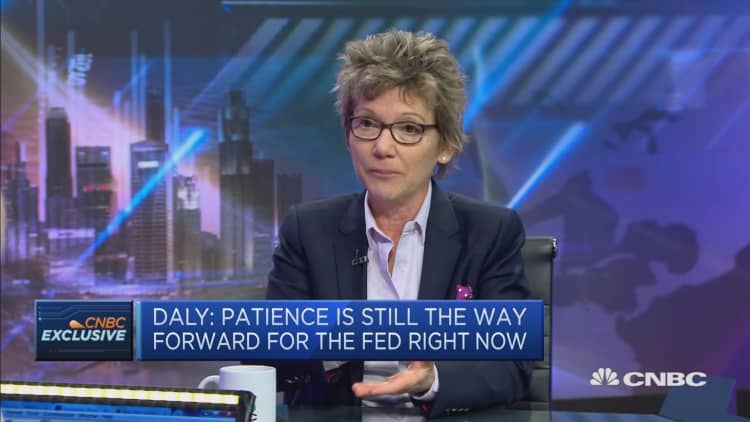
Trade uncertainties are high on the minds of investors and businesses — but they're not the only risk facing the U.S. economy right now, said Mary Daly, president and chief executive of the Federal Reserve Bank of San Francisco.
The global economy is slowing and the circumstances surrounding how the U.K. eventually leaves the European Union have also affected economic activity, Daly told CNBC's "Street Signs" on Tuesday.
"I don't want us to get too focused on only trade when there are these other looming uncertainties that also need resolution," she said.
Still, Daly — who is not a voting member on the policy-setting Federal Open Market Committee — reiterated that the U.S. economy is "in a good place" given that it is close to full employment, inflation is slowly inching up toward the Fed's 2% target, and the federal funds rate is near "neutral."
That means the Fed can afford to wait before making its next monetary policy move, she said. "I think patience is the way we should be right now," she added.
What really keeps me up at night is the data and the mood getting out of sync and, eventually, the possibility that the mood becomes the self-fulfilling prophecy of the data,Mary Dalypresident and chief executive of the Federal Reserve Bank of San Francisco
Her comment came after James Bullard, president and chief executive of the Federal Reserve Bank of St. Louis, said on Monday that an interest rate cut "may be warranted soon." He cited rising risk from trade and weak U.S. inflation as the reasons that could support such a move.
Bullard is a voting member of the FOMC.
Investors are also increasingly expecting the Federal Reserve to cut interest rates despite the central bank indicating no change to rates "for some time."
'Out of sync'
Daly said for now, the biggest risk facing the U.S. economy is uncertainty affecting business sentiment. She warned on Monday that the American economy — which is the largest in the world — could be in danger if business sentiment and economic data end up "getting out of sync."
She cited two instances when sentiment and data moved in opposite directions. In December last year, she said, economic data releases were "good" but the mood among investors and businesses was "bad." And then the reverse happened in January, she added.
"What really keeps me up at night is the data and the mood getting out of sync and, eventually, the possibility that the mood becomes the self-fulfilling prophecy of the data," Daly told reporters on Monday at the Symposium on Asian Banking and Finance in Singapore.
She warned that if "people are really uncertain, they fear a recession or they fear a downturn and this gets incorporated into their thinking and then they spend or invest less." Subsequently, "less spending and investment creates a slowdown that we wouldn't have otherwise had," she said.
To be sure, Daly said she hasn't seen that phenomenon happening in the U.S. But some businesses have started to hold back riskier investments and projects due to uncertainties.


